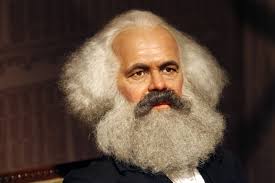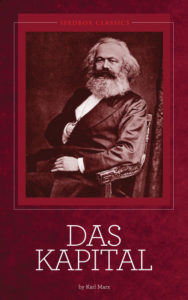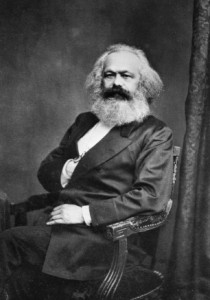Karl Marx (5 May 1818 – 14 Mar 1883)
BIOGRAPHIES, 3 May 2021
The European Graduate School – TRANSCEND Media Service
Karl Heinrich Marx was born on May 5, 1818 in the city of Trier, Germany. His father was a lawyer who came from a long line of Rabbis, but had changed his faith to Protestantism in order to keep his job. Karl Marx went to the University of Bonn to study law when he was 17 years old. Here he became engaged to Jenny von Westphalen, whose father, Baron von Westphalen, influenced Marx to read Romantic literature and Saint-Simonian politics. Only a year later, Marx was moved by his father to the University of Berlin where he studied Hegelianism, influenced by Ludwig Feurbach and other Hegelians. He admired G.W.F. Hegel‘s dialectics and belief in historical inevitability, but Marx questioned the idealism and abstract thought of philosophy and maintained his belief that reality lies in the material base of economics. In distinct contrast to G.W.F. Hegel‘s concentration on the state in his philosophy of law, Marx saw civil society as the sphere to be studied in order to understand the historical development of humankind. In 1841 Marx earned his doctorate at Jena with his work on the materialism and atheism of Greek atomists.
It was difficult for Marx to find publishers because of his radical political views, so he moved to Cologne, which was known to house a strong liberal opposition movement. The liberal group the Cologne Circle published a paper by Marx defending the freedom of the press in their newspaper The Rhenish Gazette (in 1842 he was made the editor of the paper). In Cologne Marx met Moses Hess, a radical who organized socialist meetings, which Marx attended. At these meetings Marx learned of the struggles of the German working-class. Based on the information he gathered from the members present at the meetings, Marx wrote an article on the poverty of the Mosel wine-farmers in which he was highly critical of the government. When the article was published in 1843, the Prussian authorities banned The Rhenish Gazette and threatened Marx with his arrest. Marx married his fiancé and they fled together to Paris. Here he took a position as editor of a political journal called Deutsch-Französische Jahrbücher (Franco-German Annals) that was designed to connect French socialism and radical Hegelianism. Although the journal only lived as long as one issue, it was a valuable opportunity for Marx. Through it he met his life-long friend Friedrich Engels, a contributor to the journal. Other prominent contributors included his old mentor from Berlin, Bruno Bauer, and the Russian anarchist Michael Bakunin.
 While in Paris, Marx became a communist, and worked primarily on studying political economy and the history of the French Revolution. He wrote a series of papers known as ÷konomisch-philosophische Manuskripte aus dem Jahre (Economic and Philosophical Manuscripts, 1844), however they were not published until the 1930s. The Manuscripts are influenced by Feuerbach and outline a humanist idea of communism. Marx contrasts capitalist society, and an alienated nature of labor, with communist society, in which human beings in cooperative production develop their nature freely. In 1844 Marx reviewed Bruno Bauer’s book On the Jewish Question. More than a review, Marx used the article to critique the continued influence of religion over politics, and propose a revolutionary change to the structure of European society.
While in Paris, Marx became a communist, and worked primarily on studying political economy and the history of the French Revolution. He wrote a series of papers known as ÷konomisch-philosophische Manuskripte aus dem Jahre (Economic and Philosophical Manuscripts, 1844), however they were not published until the 1930s. The Manuscripts are influenced by Feuerbach and outline a humanist idea of communism. Marx contrasts capitalist society, and an alienated nature of labor, with communist society, in which human beings in cooperative production develop their nature freely. In 1844 Marx reviewed Bruno Bauer’s book On the Jewish Question. More than a review, Marx used the article to critique the continued influence of religion over politics, and propose a revolutionary change to the structure of European society.
In 1845 Marx was expelled from France by Guizot. He fled with Friedrich Engels to Brussels where they stayed for three years with intermittent trips to England to visit Engels’ family who had cotton-spinning interests in Manchester. While in Brussels Marx wrote a piece against the idealistic socialism of P.J. Proudhon called The Poverty of Philosophy. He also worked on his materialist conception of history, and developed the manuscript that would come to be named The German Ideology when it was published after his death. This paper argues that the nature of an individual is dependent upon the material conditions that determine his production. It is a historical study of modes of production through the ages, and in it Marx predicts the collapse of industrial capitalism and the advancement of communism. Marx joined the Communist League at this time, which was an organization of German émigré workers centered in London. Marx and Engels became the major theoretical force of the League, and at a conference in 1847 they were commissioned to write a declaration of the League’s position. The hope was that the Manifest der kommunistischen Partei (The Communist Manifesto) would inspire social revolution, and no sooner was it published than the 1848 revolutions broke out across Europe. This work marks a turn in Marx’s writing from appealing to natural rights as justification for social reform, to indicating that the laws of history would inevitably lead to the power of the working class. The Manifesto distinguishes communism from other movements, proposes specific social reforms, and includes a description of the struggles between the proletariat and the bourgeoisie. It also explicitly encourages workers to unite in revolution against the existing regimes.
The panic caused by the February revolution of 1848 caused the Belgian government to expel Marx from Brussels. He was invited by the French provisional government to return to Paris. From there, he returned to Cologne with some friends to start the newspaper the Neue Rheinische Zeitung. The government there attempted to shut down the paper through legal means, and finally succeeded by finding pretexts to expel the editors. Marx and his friends were expelled after the revolts of May 1849, and the newspaper’s last edition was June 1849. Marx had to return to Paris, but he was expelled again immediately, and moved on to London, which would be his final home.
In London Marx rejoined with the Communist League, confident that there would be further revolutionary action in Europe. He proceeded to write two pamphlets about the 1848 revolution in France and its effects, titled, The Class Struggles in France and The 18th Brumaire of Louis Bonaparte. He felt that new revolution would only be possible if there was to be a new crisis, and he hoped to uncover what would cause this crisis. He spent a large amount of his time in the British Museum studying political economy toward this end. For the first part of the 1850s Marx, Jenny, and their four children lived in an impoverished state in a three room flat in London’s Soho. The couple would have two more children, but only three in all would survive. The family survived primarily on gifts from Friedrich Engels whose own income came from the family business in Manchester. Marx also earned a small amount from articles he wrote as the foreign correspondent for the New York Daily Tribune. In 1864 Marx and Friedrich Engels together founded the International Workingmen’s Association, which would finally break up due to disagreements between Marx and the anarchist Mikhail Babuknin.
By 1857 Marx had written an 800-page manuscript which was to become Das Kapital (Capital). This is his major work on political economy, capital, landed property, the state, wage labor, foreign trade and the world market. In the early part of the 1860s he took a break from his work on Das Kapital to work on Theories of Surplus Value, a three-volume work. This text discusses specific theories of political economy, primarily those of Adam Smith and David Ricardo. In 1867 Marx published volume I of Das Kapital, an analysis of the capitalist process of production, with an elaboration on his version of labor theory value, surplus value, and exploitation, that he predicted would lead to a falling profit rate and the collapse of industrial capitalism. Marx continued to work on Volumes II and III of Das Kapital for the rest of his life, even though they were essentially finished in the late 1860s. Friedrich Engels would publish the last two volumes after Marx’s death. By 1871 Marx’s daughter Eleanor, who was 17 at the time, was helping her father with his work. She had been taught at home by Marx himself, and grew up with a rich understanding of the capitalist system which would allow her to play an important part in the future of the British labor movement.
 Marx’s health rapidly declined during the last ten years of his life and he was unable to work at the same impressive pace he had set in his early years. He still paid close attention to contemporary politics, especially concerning Germany and Russia, and he often offered his comments. In his Critique of the Gotha Programme he critiqued the actions of his admirers Karl Liebknecht and August Bebel, disagreeing with their compromises with state socialism in the interest of a united socialist party. He indicated in his letters to Vera Zasulich of this time that he imagined it could be possible for Russia to bypass a capitalist stage of development and move directly to communism by basing its economy on common ownership of land characterized by the village. In 1881 both Marx and his wife became ill. Marx had a swollen liver, and survived, but Jenny died on December 2, 1881. In January 1883 Marx was deeply saddened by the loss of his eldest daughter to cancer of the bladder. On March 14, 1883 Marx was found having passed away in his armchair. He is buried at Highgate Cemetery in London.
Marx’s health rapidly declined during the last ten years of his life and he was unable to work at the same impressive pace he had set in his early years. He still paid close attention to contemporary politics, especially concerning Germany and Russia, and he often offered his comments. In his Critique of the Gotha Programme he critiqued the actions of his admirers Karl Liebknecht and August Bebel, disagreeing with their compromises with state socialism in the interest of a united socialist party. He indicated in his letters to Vera Zasulich of this time that he imagined it could be possible for Russia to bypass a capitalist stage of development and move directly to communism by basing its economy on common ownership of land characterized by the village. In 1881 both Marx and his wife became ill. Marx had a swollen liver, and survived, but Jenny died on December 2, 1881. In January 1883 Marx was deeply saddened by the loss of his eldest daughter to cancer of the bladder. On March 14, 1883 Marx was found having passed away in his armchair. He is buried at Highgate Cemetery in London.
Tags: Biography, History, Karl Marx, Marxism, Socialism
This article originally appeared on Transcend Media Service (TMS) on 3 May 2021.
Anticopyright: Editorials and articles originated on TMS may be freely reprinted, disseminated, translated and used as background material, provided an acknowledgement and link to the source, TMS: Karl Marx (5 May 1818 – 14 Mar 1883), is included. Thank you.
If you enjoyed this article, please donate to TMS to join the growing list of TMS Supporters.

This work is licensed under a CC BY-NC 4.0 License.

